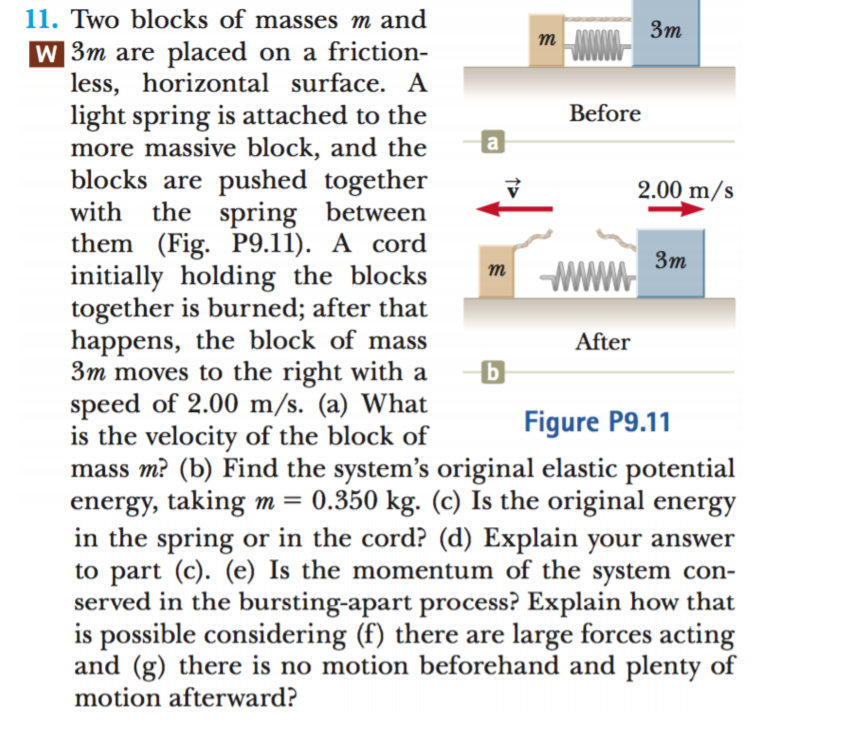11. Two blocks of masses m and w 3m are placed on a friction- less, horizontal surface. A light spring is attached to the more massive block, and the blocks are pushed together with the spring between them (Fig. P9.11). A cord initially holding the blocks together is burned; after that happens, the block of mass 3m moves to the right with a speed of 2.00 m/s. (a) What is the velocity of the block of mass m? (b) Find the system's original elastic potential energy, taking m = 0.350 kg. (c) Is the original energy in the spring or in the cord? (d) Explain your answer to part (c). (e) Is the momentum of the system con- served in the bursting-apart process? Explain how that is possible considering (f) there are large forces acting and (g) there is no motion beforehand and plenty of motion afterward? Зт т Before 2.00 m/s Зт m WWWW After Figure P9.11
11. Two blocks of masses m and w 3m are placed on a friction- less, horizontal surface. A light spring is attached to the more massive block, and the blocks are pushed together with the spring between them (Fig. P9.11). A cord initially holding the blocks together is burned; after that happens, the block of mass 3m moves to the right with a speed of 2.00 m/s. (a) What is the velocity of the block of mass m? (b) Find the system's original elastic potential energy, taking m = 0.350 kg. (c) Is the original energy in the spring or in the cord? (d) Explain your answer to part (c). (e) Is the momentum of the system con- served in the bursting-apart process? Explain how that is possible considering (f) there are large forces acting and (g) there is no motion beforehand and plenty of motion afterward? Зт т Before 2.00 m/s Зт m WWWW After Figure P9.11
College Physics
11th Edition
ISBN:9781305952300
Author:Raymond A. Serway, Chris Vuille
Publisher:Raymond A. Serway, Chris Vuille
Chapter6: Momentum, Impulse, And Collisions
Section: Chapter Questions
Problem 28P: Two objects of masses m1 = 0.56 kg m2 = 0.88 kg are placed on a horizontal frictionless surface and...
Related questions
Question

Transcribed Image Text:11. Two blocks of masses m and
w 3m are placed on a friction-
less, horizontal surface. A
light spring is attached to the
more massive block, and the
blocks are pushed together
with the spring between
them (Fig. P9.11). A cord
initially holding the blocks
together is burned; after that
happens, the block of mass
3m moves to the right with a
speed of 2.00 m/s. (a) What
is the velocity of the block of
mass m? (b) Find the system's original elastic potential
energy, taking m = 0.350 kg. (c) Is the original energy
in the spring or in the cord? (d) Explain your answer
to part (c). (e) Is the momentum of the system con-
served in the bursting-apart process? Explain how that
is possible considering (f) there are large forces acting
and (g) there is no motion beforehand and plenty of
motion afterward?
Зт
т
Before
2.00 m/s
Зт
m WWWW
After
Figure P9.11
Expert Solution
This question has been solved!
Explore an expertly crafted, step-by-step solution for a thorough understanding of key concepts.
This is a popular solution!
Trending now
This is a popular solution!
Step by step
Solved in 3 steps with 2 images

Recommended textbooks for you

College Physics
Physics
ISBN:
9781305952300
Author:
Raymond A. Serway, Chris Vuille
Publisher:
Cengage Learning

Physics for Scientists and Engineers, Technology …
Physics
ISBN:
9781305116399
Author:
Raymond A. Serway, John W. Jewett
Publisher:
Cengage Learning

Principles of Physics: A Calculus-Based Text
Physics
ISBN:
9781133104261
Author:
Raymond A. Serway, John W. Jewett
Publisher:
Cengage Learning

College Physics
Physics
ISBN:
9781305952300
Author:
Raymond A. Serway, Chris Vuille
Publisher:
Cengage Learning

Physics for Scientists and Engineers, Technology …
Physics
ISBN:
9781305116399
Author:
Raymond A. Serway, John W. Jewett
Publisher:
Cengage Learning

Principles of Physics: A Calculus-Based Text
Physics
ISBN:
9781133104261
Author:
Raymond A. Serway, John W. Jewett
Publisher:
Cengage Learning

University Physics Volume 1
Physics
ISBN:
9781938168277
Author:
William Moebs, Samuel J. Ling, Jeff Sanny
Publisher:
OpenStax - Rice University